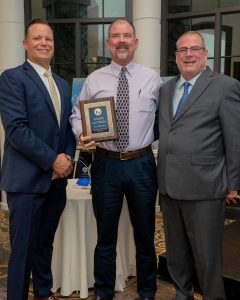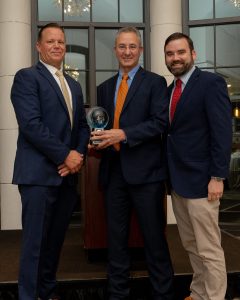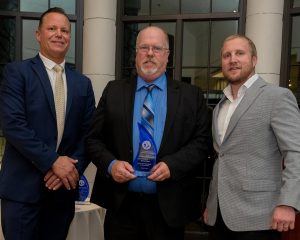CDMCS Honors Members for Outstanding Contributions to Safety
The Council for Dredging and Marine Construction Safety (CDMCS) met in Alexandria, Va., October 3 for a day of safety discussions and presentations followed by an awards dinner in the evening. The annual dinner is a venue for presenting leadership and safety awards to industry individuals, companies and the government groups who have made outstanding contributions to safety.
The mission of the organization is to promote a healthy and safe workplace and to collaborate with the U.S. Army Corps of Engineers and member companies for best practices, Devon Carlock, president of CDMCS, told The Waterways Journal.
This year’s program program included opening comments by Carlock, who is vice president of safety and government at Cottrell Contracting Corp., and Troy Larson, safety and occupational health manager at for the Corps. Maj. Gen. Jason Kelly, deputy commanding general for civil works and emergency operations for the Corps of Engineers, also addressed the group.
There followed an analysis of industry and Corps incidents and trends, an update on site safety and health by Troy Larson and a report on total recordable incidents led by Forrest Ray, environment, health and safety (EHS) director at Manson Construction Company.
Pipeline Prevention Technology
David Zambrano, a student at Florida Polytechnic University, described the processes he used to develop an external alarm system to alert equipment operators when their digging tool approaches an avoidance zone, specifically a submerged pipeline. The system can also alert operators to any buried or submerged object that must be avoided. Zambrano did the work during a summer internship at Measutronics, under the mentorship of Lou Nash.
As an extension to currently available software warnings, Zambrano’s system uses external alarms including stack lights and buzzers, with logic handled by a programmable logic controller (PLC). His talk tracked his development strategy through a low-cost building and testing process and successful integration to create a workable external alarm system that will add an important layer of safety to dredging in the presence of submerged pipeline.
Coast Guard Harassment Policy
Coast Guard Rear Adm. Wayne Arguin Jr., assistant commandant for prevention policy, and Jeremy Gauthier, director of Coast Guard Investigative Service, addressed harassment on board vessels, which is now the subject of regulation for all inspected vessels on U.S. waterways.
Arguin described scenarios that will be considered harassment by men or women of others on board in an effort to increase awareness and prevent crew members from running afoul of the regulation. All vessels with certificates of inspection (COIs) now are required to have video cameras installed on board, a precaution already on tankers and larger vessels. Gauthier described the reporting procedures for all incidents, which are aimed at protecting the anonymity of victims and providing fair investigation of incidents.
Spillway Safety
Richard Vick, safety and occupational specialist at the Norfolk Engineer District, addressed spillway safety at the Craney Island dredged material placement site. He displayed before and after photos of spillway structures such as an unmarked ground level spillway, an aging wooden footbridge over a channel and a two-story spillway structure without safe access, all of which have been replaced with highly visible structures with danger warnings, railings and safe access points.
Stretchers Aboard Vessels
Craig Taylor of Pine Bluff Sand and Gravel described the use of a stretcher designed for safely immobilizing and moving injured people in confined spaces. Taylor said, after the company acquired the system and trained personnel in its use, crew members on one of the company’s dredges soon had cause to use it. When a death occurred on board the dredge as a result of a heart attack, the crew was able to remove the deceased person with dignity.
Awards Dinner
At the end of a day of presentations, CDMCS held an awards dinner where government employees were recognized for outstanding contributions to the safety culture and contractors and employees received awards for their contributions.
Harry Tolson, superintendent and safety leader for Kokosing Industrial, received an individual award for achieving zero recordable incidents on any project for three years, which was a total of 277,000 man hours. Tolson is responsible for operations on all of Kokosing’s mid-Atlantic dredging operations and engages his crews and management in discussions on safety on a regular basis. He has made numerous changes and improvements in Kokosing’s dredging operations since taking over the role of superintendent, after starting out as a deckhand and working his way up.
David Brandon, load handling specialist for the Corps, was recognized for his work in updating, maintaining and instructing the Corps’ Learning Center’s Floating Plant Safety Course #81 in New Orleans. He joined the program two years ago when the course was about to be canceled for lack of experienced trainers. Brandon worked to build a team of instructors and add new classes to the course. His passion and commitment to the importance of floating plant safety has improved the knowledge of Corps employees who board vessels and floating plants throughout the world.





